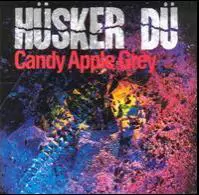One of the things Hüsker Dü is best known for is its hat trick of superb albums released between 1984 and 1985. Within 18 months, the band released the double-concept album, Zen Arcade, New Day Rising and Flip Your Wig to nearly universal acclaim. However, when the band signed to Warner Bros. Records shortly after releasing Flip Your Wig and released Candy Apple Grey in March of 1986, it was clear that there was a shift in the Hüsker's focus. That isn't to say that Candy Apple Grey was different from the band's previous work -- it mostly wasn't. There are songs where the trio still rage on with an uncompromising frenetic intensity as they build a wall of sound that virtually every alternative rock band in the `90s would emulate, but the album has a unique feature in that it is the sound of a band breaking apart. And the depressing nature of the songs reflects it.
Referred to by many as the "punk Beatles," the usual duality between the introspective Bob Mould and more optimistic Grant Hart is nigh non-existent. While the initial blast of Mould's "Crystal" is nothing new to anyone familiar with Hüsker's work, it is accompanied with Hart's "Sorry Somehow" as a more mid-tempo, but no less bitter song than any of the others on the album, with lyrics like "You want me to beg forgiveness, tender an apology. It's not my fault and you're not getting one from me."
Perhaps the album's most surprising moments, though, can be found in the middle of it. "Too Far Down" and "Hardly Getting Over It" are two acoustic songs that garnered the band a fair amount of criticism from fans more acquainted with its hardcore tendencies. Although "Hardly Getting Over It" remains a live staple at Bob Mould concerts, the two songs are startling reminders that sometimes there can be more emotion invested in an acoustic guitar than a song like "I Don't Know for Sure."
The penultimate song on the album is "No Promise Have I Made," Hüsker's only song led by a piano. The band's previous work with pianos had been limited to them either being an interlude ("One Step at a time," "Monday Will Never Be the Same," from Zen Arcade) or only playing a supporting role ("Books About UFOs," from New Day Rising). The song is a traditional ballad with the addition of strings and cymbal chiming but remains a sparse disappointment.
Released to middling reviews, Candy Apple Grey is a true sellout record. Bob Mould has said that "truth be told, the last two years nobody wanted to be in [Hüsker Dü], except that we were making a lot of money." Ironically, though, the quality of the band's output did not suffer a great amount. The songs were always good, but it was the band that suffered. In 1987, Hüsker Dü would release another double album and then break up in less than a year. Candy Apple Grey is the start of a slow decay but an album that remains an enduring, if under-appreciated listen.
